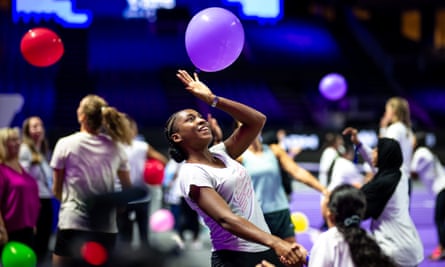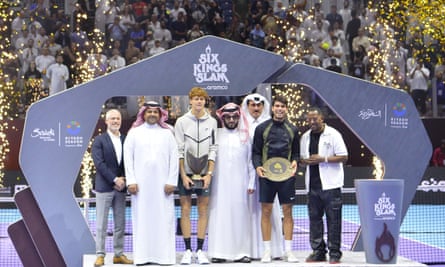Before Carlos Alcaraz dismounted from the podium after his post-match interview in the final of the Six Kings Slam exhibition event in Riyadh, Saudi Arabia earlier this month, the most accomplished young, male tennis player in the world had one more thing to say. Alcaraz took the microphone from the MC, Andrew Castle, and turned to his left.
“I just want to say thank you to his excellency for making this event possible,” he said, smiling. “I enjoyed it a lot. Last year, when I came here, this year with the best players in the world. Thank you very much for everything you have done for tennis, to bring it to the kingdom.”
Alcaraz was addressing Turki Alalshikh, the powerful chair of Saudi Arabia’s General Entertainment Authority and an adviser to the royal family. An architect of the Riyadh Season festival, Alalshikh is responsible for the attraction of countless sports and entertainment superstars from around the world to Saudi Arabia. Although Alalshikh has amassed significant power and popularity for his work, he is not a member of the Saudi royal family. It was notable that Alcaraz opted to address Alalshikh using his ostentatious honorific title.
While this may have simply been a sincere reflection of Alcaraz’s gratitude after an enjoyable and lucrative week, between similarly pointed statements from others and the intense social media promotion from all six players throughout the event, it was hard not to think of an even greater sporting superstar, Lionel Messi.

Last year, the New York Times revealed that Messi’s tourism contract with Saudi Arabia includes a clause affirming that he cannot say anything to “tarnish” the kingdom; money exchanged for his guaranteed silence. In recent years, athletes have been deftly utilised to promote the kingdom as it attempts to augment its image and amplify its power in the region while defying criticism about its human rights record. It is difficult to know where authentic beliefs end and carefully choreographed propaganda begins.
Throughout this year, Saudi Arabia has moved into tennis like never before. Rafael Nadal has taken up a lucrative role as an ambassador to the Saudi Tennis Federation. The Association of Tennis Professionals (ATP) and Women’s Tennis Association (WTA) initiated strategic partnerships with the Public Investment Fund (PIF), the country’s sovereign wealth fund. Their player rankings are now officially branded the PIF ATP Rankings and PIF WTA Rankings. PIF’s logo is present on the advertising boards and around the grounds on the tour.
After the criticism and friction that followed Saudi Arabia’s early attempts to enter other sports, the speed with which it has cut through tennis underlines how quickly attitudes have changed. And by far the most significant tennis event yet in Saudi Arabia begins on Saturday with the WTA Finals, the flagship event of the WTA that pits the best eight players in the world against each other. While the kingdom has already hosted a limited number of smaller international women’s sporting events, particularly golf, the WTA Finals is the most important women’s event in Saudi Arabia and it begins its first year of a three-year deal in Riyadh.
Inevitable as the arrangement may have appeared, the WTA’s arrival in Saudi Arabia is particularly significant, underlining the unique appeal of tennis as one of the biggest women’s sports in the world, which the kingdom can use to support its claims of reformed women’s rights. Still, the LGBTQ+ community continues to face significant repression, male guardianship laws remain in place and women’s rights activists, such as Manahel al-Otaibi and Salma al-Shehab, are subject to lengthy jail times on terrorism-related offences for simply supporting women’s rights on social media.
after newsletter promotion

As the likes of Aryna Sabalenka and Iga Swiatek convene in Riyadh to battle for one of the most important titles in the world, the stakes are high for this edition of an event that has been in disarray in recent years. Despite agreeing a 10-year deal to host the event in Shenzhen from 2019, that contract was dissolved in the aftermath of the former doubles No 1 Peng Shuai accusing the former vice-premier Zhang Gaoli of sexual coercion. After Peng disappeared from public view, the WTA initially affirmed that they would not return to China until they could directly communicate with her. In the end, the tour opted to return to China last year.
Meanwhile, the WTA Finals has moved from city to city, culminating in last year’s disaster in Cancún, where players were forced to compete in horrendous windy, wet conditions during hurricane season. There will never be anything like it again. Since the Finals plays a significant role in the WTA’s finances, recent editions of the events also ravaged the tour’s finances. This year’s prize money pool of $15.25m (£12m) is equal to the offerings of the ATP Finals in Turin.
The WTA has gone through significant changes since CVC Capital Partners bought a 20% stake in the organisation for $150m last year. This year’s Finals is the first for the new chief executive, Portia Archer, who joined in May from the NBA’s G League and all eyes of the tennis world will be on Riyadh.

.png) 2 months ago
21
2 months ago
21













































